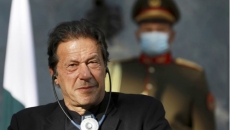GENEVA — The head of the World Health Organization lamented the lack of COVID-19 vaccines being immediately donated by rich countries to the developing world, saying that the global community is failing and that the mistakes of the AIDS pandemic are being repeated.
WHO director-general Tedros Adhanom Ghebreyesus said that there was nothing to discuss during a recent meeting of an advisory group established to allocate coronavirus vaccines.
“What do you share if there’s nothing to share?” he asked. “There are no vaccines to allocate.” Tedros said concerns being raised by some donors that African countries don’t have the infrastructure to deliver vaccines or that there are vaccine hesitancy problems, are inconsequential. “The problem is lack of vaccines. It’s not delivery, it’s not problems in absorption (of vaccines),” he said, criticizing rich countries who may be using that as a “pretext” not to donate vaccines. At the height of the AIDS crisis, life-saving antiretrovirals were not available in poor countries until about 10 years after they were being used in rich countries.
"People ask me about vaccine hesitancy in #Africa...that's not the problem. There are no vaccines," says @WHO D-G @DrTedros, stressing that we can't focus on hesitancy, absorptive capacity or delivery as barriers when there aren't any #COVID19 vaccines.
— Global Health Strategies (@GHS) June 25, 2021
"The problem is SUPPLY." pic.twitter.com/Dj7fmkdat6
Dr. Bruce Aylward, a senior adviser to Tedros, described the current situation in Africa as “dire,” noting that there had been a 50% increase in cases across the continent in the past five weeks.
“Less than 2% of the population is vaccinated...(and) every one of our (vaccine) suppliers are unable to supply us because others are making demands on those products and other (countries) are vaccinating young populations that are not at risk."
___
MORE ON THE PANDEMIC:
— Russia struggles to improve vaccine uptake as cases surge.
— Japan vaccinates 1 million a day, but will it be enough as the Olympics approach?
— What should I know about the delta variant ?
— “Scary” cluster blamed on the delta variant grows in Sydney
___
Follow more of AP’s pandemic coverage at https://apnews.com/hub/coronavirus-pandemic and https://apnews.com/hub/coronavirus-vaccine
___
HERE'S WHAT ELSE IS HAPPENING:
RALEIGH, N.C. — Less than half of North Carolinians eligible for a COVID-19 shot are fully vaccinated, even though there are more than 2.1 million doses waiting on shelves for residents to take.
In the two weeks since the state announced four $1 million prizes would be given out to vaccinated adults, less than 118,000 residents, about 1% of the state population, came in for a first dose.
North Carolina ranks 12th-worst in the nation in vaccines administered per capita, and second-worst among states with a Democratic governor, according to data from the U.S. Centers for Disease Control and Prevention.
Those lagging numbers were the context under which President Joe Biden visited Raleigh on Thursday to urge North Carolinians to come in for a COVID-19 vaccine.
“Please, please get vaccinated,” he begged, noting he was “preaching to the choir” at the Green Road Community Center.
“Folks, there is no reason to leave yourself vulnerable to the deadly virus for one single day more,” Biden told the small crowd.
___
LONDON — British officials say there were only 28 reported coronavirus cases among tens of thousands of people who attended mass-audience test events including soccer games, a snooker championship, a nightclub event, an outdoor rock concert and the Brit Awards ceremony.
The government said 58,000 people attended indoor and outdoor events in the Events Research Program in April and May, and there were “no substantial outbreaks” as a result.
But scientists cautioned that the results did not provide “direct evidence of the risk of coronavirus transmission at specific types of events.” That’s because only 15% of attendees reported the results of coronavirus tests taken both before and after the event, as they were meant to, and because infection rates in the U.K. were low at the time of the events.
Paul Hunter, professor in medicine at the University of East Anglia, said the research provided “useful information on the environment and human behavior at events that will provide valuable insights to help plan the opening up of such events. But what this study is not able to do is tell us how risky opening up such events will be now.”
To learn more, further pilot events are being held with bigger crowds -- including, contentiously, Euro 2000 final at Wembley Arena next month that’s set to be attended by more than 60,000 soccer fans.
___
WASHINGTON — U.S. health officials have granted emergency use for another antibody-drug to help hospitalized patients with the most dangerous cases of COVID-19.
The Food and Drug Administration said late Thursday it authorized the drug Actemra from Roche for hospitalized patients who are already receiving steroid drugs, oxygen and other measures to fight COVID-19.
When added to those treatments, studies showed Roche’s drug reduced the risk of death and cut hospitalization time.
Actemra does not target the coronavirus directly but instead helps reduce inflammation, a driver of the disease. It is already approved for rheumatoid arthritis and several other diseases.
The FDA has cleared several antibody drugs for COVID-19 but there has been low demand because of the hurdles of delivering them via IV at hospitals or clinics.
Health officials have emphasized the need to develop more pill-based drugs for COVID-19.
___
COLOMBO, Sri Lanka — Sri Lanka’s president says that the government will be vaccinating nearly all of its population of over 30 years of age for COVID-19 by the end of September.
President Gotabaya Rajapaksa said in a televised speech that the government has laid out plans to import 17 million doses of vaccines from China and Russia over the next three months.
By September end 13 million out of the country’s nearly 22 million people would have been vaccinated, he said.
Sri Lanka is facing a spike in the number of COVID-19 patients and Rajapaksa is facing public criticism for allegedly mismanaging the pandemic.
Sri Lanka has reported 248,050 confirmed COVID-19 patients so far including 2,814 deaths.
___
GENEVA — The head of the World Health Organization said the COVID-19 variant first seen in India, also known as the delta variant, is “the most transmissible of the variants identified so far” and that it is now spreading in at least 85 countries.
At a press briefing, WHO director-general Tedros Adhanom Ghebreyesus said the U.N. agency was concerned about it’s the increasing reach of the delta variant, particularly among unvaccinated populations.
“We are starting to see increases in transmission around the world,” Tedros said, adding that “more cases means more hospitalizations...which increases the risk of death.” WHO has previously said that two doses of the licensed COVID-19 vaccines appear to provide strong protection against the variant first seen in India, but warned the lack of access to vaccines in poor countries — which have received fewer than 2% of the billion doses administered so far — makes them extremely vulnerable.
Tedros also said the unchecked circulation of the coronavirus could lead to the emergence of even more variants.
“New variants are expected and will continue to be reported,” Tedros said. “That’s what viruses do. They evolve,” he said. “But we can prevent the emergence of variants by preventing transmission.”
___
AMSTERDAM — The European Medicines Agency has approved a new manufacturing site for Johnson & Johnson’s COVID-19 vaccine, in a move that should boost production of the one-dose vaccine across the 27-nation EU.
In a statement, the EU drug regulator said the new site in Anagni, Italy, will finish manufacturing of the J&J vaccine, which was licensed for use in adults across Europe in March. Production problems have stalled J&J’s roll-out across the European Union in recent months and millions of doses made at a U.S. factory had to be thrown out after contamination issues.
The EU has ordered 200 million doses of the J&J vaccine and was expecting 55 million by the end of June; to date, fewer than 14 million doses have been distributed.
J&J’s vaccine roll-out was also stalled after the EMA concluded there was a “possible link” between the coronavirus shot and very rare blood clots and recommended that a warning should be added to the label. Health officials say the vaccine’s benefits still far outweigh the risks.
___
JERUSALEM — Israel, a world leader in vaccinations, is once again requiring people to wear masks in indoor public spaces amid a coronavirus outbreak driven by the arrival of a new variant.
Israel rolled out one of the most successful vaccination campaigns in the world, inoculating some 85% of its adult population. In recent months, nearly all restrictions were lifted as the number of active cases plummeted.
But there has been a spike in recent days after weeks in which the number of new daily cases was in the single or low double digits. Dr. Nachman Ash, who is leading the coronavirus response, said 227 new cases were confirmed on Thursday, according to Israeli media.
The Health Ministry said masks must be worn indoors in public places starting midday Friday.
The outbreak appears to be driven by the arrival of the highly contagious delta variant, which spreads rapidly among unvaccinated individuals, including children. Vaccinated Israelis have reportedly been infected, but generally appear to have only minor symptoms.
Earlier this week, the government postponed the planned reopening of the country to vaccinated tourists until the beginning of August. It was originally set for July 1, and vaccinated tour groups have been permitted since May.
Israel has reported 6,429 deaths since the start of the pandemic, in a population of 9.3 million.
___
BERLIN — Germany’s health minister has lamented that European Union countries haven’t been able to agree a single set of rules for travelers from regions with high rates of coronavirus variant cases.
Chancellor Angela Merkel had raised the issue at a summit of EU leaders in Brussels. Germany requires people arriving from so-called ‘virus variant’ areas such as Britain to quarantine for 14 days, even if they are fully vaccinated; other EU countries have shorter or no quarantine periods for vaccinated people.
Health Minister Jens Spahn told reporters in Berlin on Friday that he regretted better coordination among the bloc’s 27 members hadn’t been possible.
“It would have been better to find uniform rules for this,” he said. “If not, we will have to keep making our own to protect ourselves.”
German officials say the more contagious delta variant of the virus now makes up at least 15% of cases in the country. In Britain, it has already become the dominant variant.
Lothar Wieler, the head of Germany’s disease control agency, said he expects the delta variant to eventually dominate in Germany, too, and urged people to get vaccinated as soon as possible.
Scientists say vaccines authorized for use in the European Union provide good protection against serious illness, including from the delta variant, but it is not yet clear how great the risk is that immunized people can still transmit the virus.
___
HONOLULU — Hawaii is dropping its testing and quarantine rules for vaccinated domestic travelers in two weeks.
Gov. David Ige says the state will drop the current travel restrictions for fully vaccinated U.S. mainland travelers on July 8.
The governor says he expects the state will reach a 60% vaccination rate among all residents by that time. Ige had previously set a 60% rate as a milestone for allowing more so-called vaccine passports.
Restaurants will also be able to seat up to 75% of their capacity.
People will still be required to wear a mask when gathering indoors. Masks are not required outdoors.
___
SEATTLE — A Nigerian information technology worker has been indicted on federal wire fraud and identity theft charges after authorities said he and his co-conspirators filed false claims for pandemic-related unemployment benefits in 17 states.
According to an indictment unsealed in Seattle, Chukwuemeka Onyegbula was linked to at least 253 fraudulent filings for unemployment benefits.
The states paid out nearly $290,000.
Onyegbula has been detained in Nigeria, but prospects for his extradition to the U.S. were unclear.
Court documents did not list an attorney who might comment on his behalf.
___
WASHINGTON — The White House says it will provide Afghanistan with 3 million doses of Johnson & Johnson’s COVID-19 vaccine to help with a coronavirus outbreak fueled by the delta variant.
White House spokesperson Karine Jean-Pierre made the announcement aboard Air Force One as President Joe Biden flew to Raleigh, North Carolina, to encourage Americans to get vaccinated. The announcement also came a day before Biden met with Afghanistan’s leaders at the White House.
Jean-Pierre says the Johnson & Johnson vaccines — only one shot is required — could be shipped as soon as next week.
The U.S. is also providing oxygen and other supplies to Afghanistan.
The 3 million doses are part of an overall donation of 55 million doses to the world that the White House announced earlier this week.
___
COLUMBIA, S.C. — South Carolina Gov. Henry McMaster signed a bill preventing people from suing companies over COVID-19.
The new law protects businesses and other groups as long as they follow guidelines to protect people from the virus. Dozens of other states have passed similar measures.
McMaster again said his decision to resist closing restaurants and other businesses as long as he could and allow them to reopen more quickly meant South Carolina suffered fewer economic problems.
The May unemployment rate in the state was 4.6%, down from the pandemic high of 11.5% in May 2020 and well below the national rate of 5.8% in May 2021, according to the South Carolina Department of Employment and Workforce.
COVID-19 has killed more than 9,800 people in South Carolina since March 2020. Only about 37% of the population has been fully vaccinated against the disease.
After the bill signing, McMaster said he wasn’t worried about the low vaccine rates or new COVID-19 variants that have caused increased case counts and hospitalizations in other states.
___
HAGATNA, Guam — Guam could be lifting more travel restrictions as its vaccination rate approaches 75% of the adult population.
Guam Gov. Lou Leon Guerrero has been advised by her Physicians’ Advisory Group to consider lifting the U.S. territory’s travel restrictions once 75% of the adult population has been fully vaccinated, the Pacific Daily News reported Thursday.
Guam has already lifted travel quarantine and testing rules for fully vaccinated people. Everyone else must be tested within three days of their arrival to avoid quarantine.
Currently, 72% of Guam’s adult population is fully vaccinated, officials report. The islands could be just days away from 75%, the newspaper reported.
At 80%, the governor said she will “liberate” people from the pandemic. Her goal is to reach 80% by July 21.
“My vision for Guam after July 21 is to get back to normal,” the governor said, adding that she would still encourage masks but plans to drop occupancy limits and social gathering restrictions.
___
BUCHAREST, Romania — Romania’s national vaccination committee chief announced tens of thousands of doses of AstraZeneca vaccine are set to expire and will likely have to be destroyed.
“On June 30, 35,000 AstraZeneca vaccine doses expire. We probably won’t be able to use them. They will enter the destruction procedure,”.
AstraZeneca is one of four authorized vaccines currently being administered in Romania but has faced a low uptake in the country of more than 19 million, where around just 23% of the population have been fully inoculated against COVID-19.
In recent weeks, daily vaccinations have sharply dropped. In mid-May, around 100,000 vaccines were being administered a day, compared to around just 25,000 a day over the last week.
Since the pandemic began, more than a million COVID-19 infections have been confirmed in Romania, and nearly 33,000 have died.
___
LONDON — Britain on Thursday added 17 countries and territories, including Malta, the Balearic Islands and Madeira, to its “green” list of safe travel destinations amid pressure from airlines and travel companies to relax COVID-19 restrictions.
The additions mean that people traveling to those destinations will no longer have to self-isolate for 10 days when they return to the U.K.
The government also announced its intention to relax current rules and allow travelers who have been fully vaccinated to visit “amber” list countries without having to self-isolate on their return to Britain.
The Department for Transport said it expects to implement this policy in phases later in the summer. The amber list currently includes the U.S. and most of the European Union.
The destinations added to the green list are: Malta, Madeira, the Balearic Islands, Anguilla, Bermuda, British Antarctic Territory, British Indian Ocean Territory, British Virgin Islands, Cayman Islands, Montserrat, Pitcairn Islands, Turks and Caicos Islands, Antigua, Barbuda, Dominica, Barbados and Grenada. The changes take effect at 4 a.m. June 30.
___
SAN FRANCISCO — San Francisco city workers will be required to be vaccinated against the coronavirus when a vaccine receives full federal approval.
The policy covering 35,000 municipal workers may be the first by any city or county in the U.S.
Employees who refuse to get vaccinated and don’t get a medical or religious exemption could be fired.
The three COVID-19 vaccines currently available in the U.S. are being dispensed under emergency authorization by the Food and Drug Administration.
They are expected to receive full approval in several months and San Francisco city employees will then have 10 weeks to get their shots.
San Francisco, a compact city of nearly 900,000 residents, has had some of the strictest pandemic-related restrictions in the country and its vaccination rates are very high.
The vaccination policy for city employees covers a wide range of jobs but it does not include teachers, who are school district employees.





